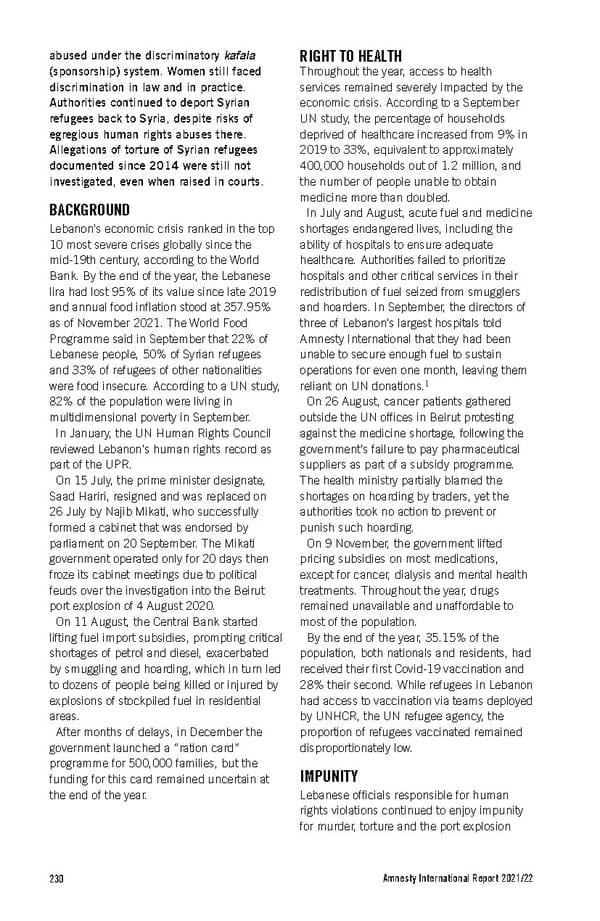abused under the discriminatory kafala RIGHT TO HEALTH (sponsorship) system. Women still faced Throughout the year, access to health discrimination in law and in practice. services remained severely impacted by the Authorities continued to deport Syrian economic crisis. According to a September refugees back to Syria, despite risks of UN study, the percentage of households egregious human rights abuses there. deprived of healthcare increased from 9% in Allegations of torture of Syrian refugees 2019 to 33%, equivalent to approximately documented since 2014 were still not 400,000 households out of 1.2 million, and investigated, even when raised in courts. the number of people unable to obtain BACKGROUND medicine more than doubled. In July and August, acute fuel and medicine Lebanon’s economic crisis ranked in the top shortages endangered lives, including the 10 most severe crises globally since the ability of hospitals to ensure adequate mid-19th century, according to the World healthcare. Authorities failed to prioritize Bank. By the end of the year, the Lebanese hospitals and other critical services in their lira had lost 95% of its value since late 2019 redistribution of fuel seized from smugglers and annual food inflation stood at 357.95% and hoarders. In September, the directors of as of November 2021. The World Food three of Lebanon’s largest hospitals told Programme said in September that 22% of Amnesty International that they had been Lebanese people, 50% of Syrian refugees unable to secure enough fuel to sustain and 33% of refugees of other nationalities operations for even one month, leaving them 1 were food insecure. According to a UN study, reliant on UN donations. 82% of the population were living in On 26 August, cancer patients gathered multidimensional poverty in September. outside the UN offices in Beirut protesting In January, the UN Human Rights Council against the medicine shortage, following the reviewed Lebanon’s human rights record as government's failure to pay pharmaceutical part of the UPR. suppliers as part of a subsidy programme. On 15 July, the prime minister designate, The health ministry partially blamed the Saad Hariri, resigned and was replaced on shortages on hoarding by traders, yet the 26 July by Najib Mikati, who successfully authorities took no action to prevent or formed a cabinet that was endorsed by punish such hoarding. parliament on 20 September. The Mikati On 9 November, the government lifted government operated only for 20 days then pricing subsidies on most medications, froze its cabinet meetings due to political except for cancer, dialysis and mental health feuds over the investigation into the Beirut treatments. Throughout the year, drugs port explosion of 4 August 2020. remained unavailable and unaffordable to On 11 August, the Central Bank started most of the population. lifting fuel import subsidies, prompting critical By the end of the year, 35.15% of the shortages of petrol and diesel, exacerbated population, both nationals and residents, had by smuggling and hoarding, which in turn led received their first Covid-19 vaccination and to dozens of people being killed or injured by 28% their second. While refugees in Lebanon explosions of stockpiled fuel in residential had access to vaccination via teams deployed areas. by UNHCR, the UN refugee agency, the After months of delays, in December the proportion of refugees vaccinated remained government launched a “ration card” disproportionately low. programme for 500,000 families, but the IMPUNITY funding for this card remained uncertain at the end of the year. Lebanese officials responsible for human rights violations continued to enjoy impunity for murder, torture and the port explosion Amnesty International Report 2021/22 230
 Amnesty International Report 2021/22 Page 229 Page 231
Amnesty International Report 2021/22 Page 229 Page 231